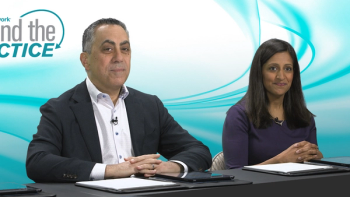
Tanios S. Bekaii-Saab, MD, presents a patient scenario of a 64-year-old man with stage 2 (pT3N0) colon cancer to the panel for discussion.

Your AI-Trained Oncology Knowledge Connection!


Tanios S. Bekaii-Saab, MD, presents a patient scenario of a 64-year-old man with stage 2 (pT3N0) colon cancer to the panel for discussion.

Aparna Parikh, MD, MS, details when she would recommend adjuvant chemotherapy to patients with similar presentations of colorectal cancer.

Stacey A. Cohen, MD, and Daniel H. Ahn, DO, describe the challenges of deciding which patients with colorectal cancer should receive adjuvant therapy, and the risk of over- and under-treatment in later stages.

Dr Stacey A. Cohen discusses how she typically monitors patients with stage II and III colorectal cancer during and after adjuvant therapy.

Dr Aparna Parikh explains minimal residual disease (MRD) in colorectal cancer and the logistical challenges of MRD testing.

The panel discusses other emerging biomarkers for monitoring patient response to therapy for colorectal cancer.

Aparna Parikh, MD, MS, defines circulating tumor DNA (ctDNA) and the use of ctDNA assays in colorectal cancer.

Dr Daniel H. Ahn explains the logistical concerns of ctDNA testing in colorectal cancer.

The panel reviews the different settings in colorectal cancer where ctDNA is being investigated as a tool for treatment and monitoring.

Stacey A. Cohen, MD, and Aparna Parikh, MD, MS, review the design and outcomes of key clinical trials exploring the use of ctDNA assays in colorectal cancer.

The panel comments on how they see ctDNA assay usage evolving in colorectal cancer management.

The panel shares some closing thoughts on ctDNA testing in patients with colorectal cancer.